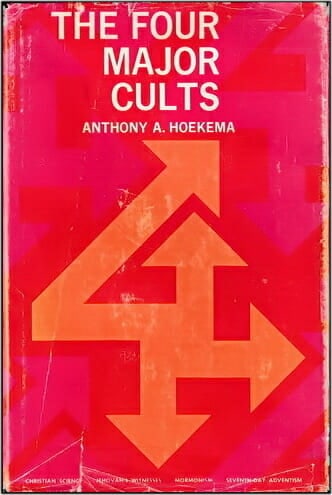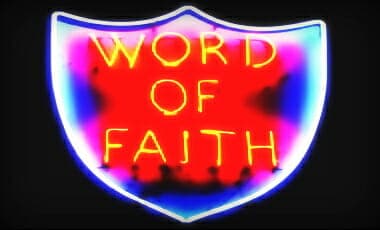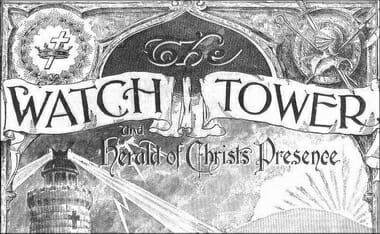Anthony A. Hoekema (1913-1988) was a Christian theologian of the Dutch Reformed tradition who served as professor of Systematic theology at Calvin Theological Seminary for twenty-one years.
Hoekema was born in the Netherlands but immigrated to the United States in 1923. He attended Calvin College (A.B.), the University of Michigan (M.A.), Calvin Theological Seminary (Th.B.) and Princeton Theological Seminary (Th.D., 1953). After pastoring several Christian Reformed churches (1944-56), he became Associate Professor of Bible at Calvin College (1956-58). From 1958 to 1979, when he retired, he was Professor of Systematic Theology at Calvin Theological Seminary in Grand Rapids, Michigan.
(BTW, Hoekema was an Amillennialist. I do not personally hold this position. Likewise, this position has very little impact on the whole of these “traits” of aberrant beliefs… if any. A good 9-minute challenge to a main portion of his “Kingdom” view is HERE.)
- Anthony A. Hoekema, The Four Major Cults: Christian Science, Jehovah’s Witnesses, Mormonism, Seventh-Day Adventism (Grand Rapids, MI: William B. Eerdmans Publishing Company, 1963), 377-388.

[p.377>] THE DISTINCTIVE TRAITS OF THE CULT
In setting forth what I believe to be the distinctive traits of the cult, I do not wish to give the impression that not the slightest trace of these characteristics is to be found in the churches. If we are honest with ourselves, we shall find vestiges of these characteristics in the churches too. I venture to affirm, however, that [p.378>] the traits which will now be described are so uniquely characteristic of the cult that any group in which they play a leading role can no longer be recognized as belonging to the true church of Jesus Christ.
(1) An Extra-Scriptural Source of Authority. As the first of these distinctive traits of the cult, I instance the presence of an extra-Scriptural source of authority. Hutten aptly calls this trait “a Bible in the left hand.” Recalling the ordination of a Sweden-borgian minister, who held a Bible in his right hand and one of Swedenborg’s books in his left, Hutten observes that every cult has such a “Bible in the left hand,” which actually supersedes the Bible in the right hand. It should be added here that the cults face a kind of dilemma with respect to the question of authority. Since, in distinction from non-Christian religions, they claim to be Christian groups, they must somehow appeal to the authority of the Bible. Yet in order to justify their peculiar doctrines they must either correct Scripture, reinterpret Scripture, or add other sources of authority to Scripture. Their attitude toward Scripture is therefore always an ambivalent one: a mixture of apparent subjection to its authority and of arbitrary manipulation of its teachings.
That this matter of ultimate authority is of determinative importance in evaluating the cults has already been implied by the inclusion of a section on “Source of Authority” in the discussion of each of the cults treated in this volume. It was found that every cult discussed did, indeed, find its ultimate ground of authority in some extra-Scriptural source. Mormons, it was seen, consider the Bible to be full of errors and in dire need of supplementary material; hence their ultimate source of authority is found not in the Bible, but in the Book of Mormon, Doctrine and Covenants, and The Pearl of Great Price. If there should be a contradiction between what is taught in the Bible and what is taught in these. supplementary sacred books, it is the teachings of the latter which are determinative for Latter-day Saints (see above, pp. 18-30), For Christian Scientists, the final source of authority is Mrs. Eddy’s Science and Health, with Key to the Scriptures; although the Bible is read at their Sunday services, it is Science and Health which determines how the Bible is to be understood (see above, pp. 182-86). Though Jehovah’s Witnesses claim that the only basis for their teachings is the Bible, it has been seen that their New World Translation is a biased rendering of the Scriptures [p.379>] into which they have smuggled many of their own heretical teachings, that their method of using Scripture is to find passages which seem to support their view and to ignore passages which fail to provide such support, and that they insist that the Bible may only be understood as it is interpreted by the leaders of the Watchtower Society (see above, pp. 237-48).
The reader is reminded of the discussion found on pages 30-33, above, where it was pointed out that the Bible itself condemns the attempt to supplement it with any additional source of authority. These “Bibles in the left hand” are never innocent appendages to Scripture; they always overmaster and overshadow the truth of Scripture. Whenever a cult raises a book or a set of books to the level of Scripture, it does violence to the Word of God. God is no longer allowed to speak as He does in the Bible; He may now speak only as the sect deems proper. Thus the Word of God is brought under the yoke of man.
The claim of the cults to have a source of revelation beyond the Scriptures – for that is what these “Bibles in the left hand” really amount to — is a claim which places them outside the pale of Christian churches. It may be added, by way of warning, that whenever a denomination of Christendom gives so much veneration to a human teacher or group of teachers that he or they are thought to be virtually infallible, it is in this respect manifesting a trait of the cult! People in the Corinthian Church who said that they belonged to Paul, Apollos, or Cephas were rebuked by Paul as being carnally minded; they were told, instead, that Paul, Apollos, and Cephas belonged to them! (I Cor. 3:21-23). Christians today who might be tempted to say that they belong to, say, Calvin or Luther, should learn from this passage that the Biblical way of expressing our relationship to human leaders is this: they (the human leaders) belong to us, but we belong to Christ. If these leaders belong to us, their writings may never be considered superior in authority to the Word of God. Sola Scriptura must remain the motto of every truly Protestant Church!
(2) The Denial of Justification by Grace Alone. A second distinctive trait of the cult is the denial of the doctrine of justification by grace alone. Grace is no longer considered the free gift of God to the unworthy sinner, but a reward which has been earned by the faithful keeping of various conditions and requirements. Hutten, in fact, calls this trait the most basic character- [p.380>] istic of the cult. The Reformation, he contends, asserted the principle of solo gratia: man is saved by grace alone. Salvation, the Reformers taught, does not depend on any human or ecclesiastical co-operation with God. The concept gratia implies that salvation is given freely by God apart from any conditions which man may fulfill or which the church may make available. Even those responses to the Gospel which take place in man through the working of God’s Spirit — his faith, his conversion, his works, and his walk — are not meritorious, since they are all the fruits of God’s grace. Precisely because salvation is all of grace, it can never be a ground for Pharisaic pride but must always move us to deep humility and gratitude.
This demand for humility, however, goes against the grain of human nature. Man wants to be his own lord and master. This is especially so in the matter of his salvation. He shrinks from taking the leap of faith — a leap in which he must trust wholly in God for his salvation. He prefers to take his future destiny into his own hands; he does not wish to surrender this destiny to a strange, unknown power. This fundamental human drive, Hutten continues, is the real root of the cult’s protest against the church. The basic antithesis of the cult to the church is therefore the cult’s antipathy toward the central message of the Reformation: the message of justification by grace alone and by faith alone (.cola gratia, solo fide). Though there are variations in the degree to which the different cults reject this doctrine, they all do reject it. As a matter of fact, Hutten adds, the church must always be on its guard against slipping into this cultic manner of thinking about the way of salvation. Only when the church has completely conquered this cultic tendency within its own borders, will it have the strength to oppose the cult on this point.
It will not be difficult to show that the trait described above is found in the cults we have studied. Mormons, as has been seen, reject the doctrine of justification by faith as a pernicious doctrine which has exercised an influence for evil in the church. They further teach that individual salvation (entrance into one of the three Mormon heavens) is to be merited by man through his own acts, and that one can only become eligible for the highest degree of salvation by keeping the commandments of the Lord in all things (see above, pp. 59-62). Christian Scientists decisively reject justification by grace alone; for them, salvation from sin is accomplished when one ceases to sin, or when one stops believing that there is such a thing as sin — on either interpretation salva‑ [p.381>] tion is achieved by human works and not by the grace of God (see above, p. 212, and compare pp. 209-12). Though Jehovah’s Witnesses claim that salvation is of grace and that all credit for salvation belongs to Jehovah (see above, p. 283), a careful study of their writings will reveal that they, too, reject justification by grace. In the case of the 144,000, man saves himself by exercising faith, repentance, and dedication to Christ (functions in which he is said not to be dependent on God), by showing himself worthy of being selected as a member of the anointed class, and by carrying out his dedication to Jehovah faithfully until death (see above, pp. 282-83; compare pp. 279-83). In the case of the other sheep, these, without having had their natures renewed, are able to exercise faith in Christ, to dedicate their lives to him, and to remain faithful to the end — this faithfulness to be revealed chiefly by diligent witnessing (see above, pp. 283-85). After the millennium has begun, these other sheep, whether as survivors of Armageddon or as resurrected beings, are to be judged on the basis of their obedience to Jehovah during the millennium. If they continue to obey God during Satan’s final battle, they will be “justified,” that is, given the right to perfect life on the new earth — this “justification,” however, is based not on faith, but on works. As far as others are concerned, billions of those who, though sincere in their belief, lacked an opportunity to learn of righteousness from God will be raised during the millennium, will be instructed in God’s law, and will receive everlasting life on the new earth if they now obey God’s commandments.
It is clear, therefore, that these three cults definitely and deliberately reject the doctrine of justification by grace alone. Though they may speak of the grace of God, their theologies have no room for grace in the real sense of the word. For, as the Bible says, “If it [the remnant according to the election of grace] is [saved] by grace, it is no more of works; otherwise grace is no more grace” (Rom. 11:6). Note also the severe judgment leveled by Paul against this position in Galatians 5:4, “Ye are severed from Christ, ye who would be justified by the law; ye are fallen away from grace.” Crystal clear is Titus 3:5: “Not by works done in righteousness which we did ourselves, but according to [p.382>] his mercy he saved us….” By taking the position sketched above, therefore, the cults deny one of the cardinal teachings of Scripture.
(3) The Devaluation of Christ. In the third place, all cults are guilty of a devaluation of Christ. Hutten points out that, since the cult has assumed a determinative role in the distribution of salvation, the result is bound to be a minimizing of Christ as the only Mediator. This, he adds, does not need to mean a complete denial of Christ’s mission and work; it may express itself simply in a shifting of emphasis. We shall see this tendency revealing itself in a twofold way: in a devaluation of the Person of Christ and in a depreciation of His work. The latter is particularly characteristic of the cult; since salvation for the cult is not determined by the grace of God revealed at the cross of Christ, that cross is robbed of its unique soteriological significance.
Let us see how this trait can be found in the cults we have studied. Mormons teach that Jesus Christ was the firstborn of the spirit-children of Elohim; since, however, all men are spirit-children of Elohim, it is evident that the difference between Christ and men (even, for that matter, between Christ and Satan) is one of degree but not one of kind (see above, pp. 53-54). Christ is considered by Mormons not to be equal to the Father; he shared with other pre-existent spirits like Adam and Joseph Smith the task of “creating” this earth, and his incarnation is not unique, for other gods before him were incarnated on other earths (see above, p. 54). In fact, Christ’s incarnation was only illustrative of what happens to every man who perfectly fulfills all the ordinances of the Gospel: he, too, was once a pre-existent spirit, is now incarnate, and will some day be a god (see above, pp. 54, 61-62, 72). As far as the work of Christ is concerned, Mormons affirm that the atoning death of Christ was necessary to deliver all men from death, and did provide for all the right to be raised from the dead (see above, pp. 57-58). As was just observed, however, Christ’s atonement does not provide individual salvation for man since this is to be merited by man’s own acts; thus the Mormon Christ does not save in the full sense of the word but only gives man an opportunity to save himself (see above, pp. 58-61).
According to Christian Science, Jesus was not God but only a man, whereas Christ is the name for a certain divine idea: the idea that sickness and sin can be healed through Christian Science (see above, pp. 200-202). Jesus was therefore simply a man who demonstrated a divine idea. So unimportant, in fact, is Jesus in [p.383>] Christian Science that Mrs. Eddy could say that if such a person as Jesus had never existed, it would make no difference to her! (see above, p. 203). As far as the work of Jesus is concerned, Christian Scientists deny that he atoned for our sins by shedding his blood on the cross — after all, since sin has no real existence, why does it need to be atoned for? Jesus’ work was rather that of demonstrating the truth of Christian Science and of setting us an example of the kind of life we must live. Even this example, however, is not uniquely distinguished from that of the apostles (see above, pp. 207-9).
What Jehovah’s Witnesses do with the person of Christ is well known: he was, for them, not equal to Jehovah, but the first creature of Jehovah. In his prehuman state he was a created angel; during his stay on earth he was nothing more than a man; and after his stay on earth he was again nothing higher than a created angel, though now endowed with immortality. In none of these three stages, therefore, was or is Christ equal to Jehovah (see above, pp. 270-76). As regards the work of Christ, the Witnesses teach that Christ did lay down his human life for his people as a ransom. By means of this ransom Christ redeemed man from inherited sin and from the prospect of eternal death as a result of that sin (see above, pp. 276-77); his ransom provides a resurrection from the dead for all except certain classes of people (see above, p. 317). Christ did not, however, earn the right to everlasting life in heaven for the 144,000 since he earned only a perfect human life with its rights and earthly prospects; the 144,000 must themselves earn the right to heavenly life by sacrificing their earthly prospects (see above, p. 283). As for those who will spend eternity on the new earth, they, as we saw, will receive this blessing only if they have obeyed Jehovah’s commandments during the millennium. Neither the 144,000 nor those who will inhabit the new earth, therefore, are really saved by the work of Christ; Christ’s ransom has only served the purpose of enabling them to earn their future blessedness, either in heaven or on earth, by their own achievements.
It is quite clear, therefore, that the cults leave us with a Christ who is not the Christ. Neither in his person nor in his work is the Christ of the cult the Christ of the Bible. For the cultist, it is not really Christ who saves but man who must save himself. This position, however, cuts the very heart out of the Bible: “For God so loved the world, that he gave his only begotten Son, that whosoever believeth on him should not perish, but have eternal life” (Jn. 3:16). The words of Paul to the Galatians, directed against those who in that day taught that one was saved partly [p.384>] through faith in Christ and partly through performing certain works of the law, are equally applicable to the cults of our day: “But though we, or an angel from heaven, should preach unto you any gospel other than that which we preached unto you, let him be anathema” (Gal. 1:8).
(4) The Group as the Exclusive Community of the Saved. A fourth distinctive trait of the cult is that it absolutizes itself as the exclusive community of the saved. Hutten points out that the anti-ecclesiastical polemic which is so characteristic of the cult is but the converse side of its own self-justification. Since the cult is convinced that it is the only true community of God’s people, it must try to show that the church is either an apostate organization or an actual instrument of the devil. There is among the cults no appreciation for the Biblical doctrine of the “one holy catholic Church” — that is, of the universal church of Christ, composed of Christ’s true people of all the ages and from all the nations. Every cult says, “We alone are the people of God.” The cult, so to speak, takes God by the arm, insisting that His evaluation of people must agree with its own.
Let us see how this trait is found in the cults we have studied. Mormons contend that the church of Jesus Christ was in a state of apostasy until God revealed Himself to Joseph Smith in 1820; when Smith and Oliver Cowdery received the Aaronic and Melchizedek priesthoods from heavenly messengers in 1829 and 1830, the Restoration of the Church took place. The Mormon Church is therefore the only true church — because it alone has the Priesthood of the Almighty, and it alone since the time of Christ has received and may still receive divine revelation. One of the early apostles of the Mormon Church claimed that non-Mormon churches have no right to call themselves Christian since Christ has nothing to do with them, and a recent Mormon writer has said that there is no salvation outside the Church of Jesus Christ of Latter-day Saints (see above, pp. 62-64). It may be noted that the possibility of salvation for those who died in ignorance of Mormon teaching only confirms the point under discussion since such people can be saved only if Mormons have been baptized for them (see above, pp. 64-66).
Christian Science also claims to be the only true church. Since Mrs. Eddy is said to have received the final revelation of the divine principle of scientific mental healing, and since Science and Health is said to be the voice of truth uncontaminated by [p.385>] human hypotheses, it follows that, according to them, no group outside of Christian Science has or knows the truth (see above, pp. 183, 212-13). Though individual Christian Scientists may express appreciation for other Christian groups, it is clear from the statements just alluded to that the views of all other churches about the Bible and the way of salvation must officially be considered basically erroneous while Christian Science is held to be unerring and divine (see above, p. 184).
In Jehovah-Witness ecclesiology we reach the ultimate in bigotry. It is said by them that Jehovah’s Witnesses alone are God’s true people and that all others, without exception, are followers of the devil. The Watchtower Society is now the only instrument or channel whereby Jehovah teaches His people on earth (see above, p. 247). The “great whore” of Revelation 17 is organized religion, Christian as well as heathen. The visible part of the devil’s organization on earth includes all of Christendom, Protestant as well as Roman Catholic. The religious clergy are, in fact, the direct link between mankind and the demons (see above, pp. 285-86). At Armageddon all of earth’s inhabitants except Jehovah’s Witnesses will be wiped out of existence (see above, p. 311). Only Jehovah’s Witnesses, therefore, will survive Armageddon; during the millennium non-Witnesses who are raised from the dead will be given an opportunity to save themselves in response to the preaching and teaching of the princes, prominent among whom will be those who occupied leading positions with the New World Society on earth (see above, pp. 318-21).
Whenever a group takes the position that it is the only community of the saved, however, it violates an important aspect of Scripture teaching. Christ Himself warned against this type of bigotry when his disciples said to Him, “Master, we saw one casting out demons in thy name, and we forbade him, because he followeth not with us.” Jesus replied, “Forbid him not; for he that is not against you is for you” (Lk. 9:49, 50). We should therefore remember that whenever a denomination slips into a kind of thinking similar to that described above, it reveals a tendency toward cultic behavior.
(5) The Group’s Central Role in Eschatology. The last distinctive trait of the cult I would like to mention is this: the cult plays a central role in the eschatological climax of history. The cult is convinced that it has been called into existence by God for the purpose of filling in some gap in the truth which has been neglected by the ordinary churches. The birth of the cult thus marks the final climax of sacred history, the beginning of the [p.386>] latter days. Eschatology thus plays a determinative role in the
theology of the cult: it becomes the arena in which the glorification of the cult will complete itself. The cult is therefore the messenger and way-preparer for the imminent return of Christ; it is God’s partner in the drama of the end-time; it is the ark of safety for the coming flood; it is the instrument of divine judgment on unbelievers; it shall finally triumph in the sight of all the world as the group particularly favored by God.
This type of procedure Hutten calls a cultic perversion of Biblical eschatology. Whenever the cult has developed an eschatology, he continues, it places itself in the very center of it. The drama of the last things thus becomes the means whereby the cult is glorified and all its enemies are overwhelmingly defeated. Though the cult may now be small and insignificant, when the final climax of history arrives, it will receive from God the place of honor it deserves as a reward for its faithfulness to His commandments. The antithesis between God and Satan which has run through history will in the last days reach its climax as an antithesis between the cult and the rest of mankind, particularly the church.
As we attempt now to see how this trait is revealed in the cults we have studied, we must first make an important exception. Because of the absence of a real historical dimension in Christian Science, the latter has no general eschatology; hence it cannot be precisely fitted into the category just described. Christian Science denies that there will be a literal Second Coming of Christ, a general resurrection, a final judgment, and a new earth (see above, pp. 219-21). Though there is a kind of individual eschatology in this system, there is no general eschatology in the sense of a final, dramatic climax of history. Yet Christian Scientists do manifest a trace of the characteristic in question, since Mrs. Eddy contended more than once that what the Bible calls the Second Coming of Jesus Christ actually coincided with the rise of Christian Science (see above, p. 219). By statements such as these Mrs. Eddy did, in a sense, place Christian Science in the center of eschatology.
[p.387>] It will not be difficult to show the presence of the trait under discussion in the other two cults being considered. Mormons very definitely place themselves in the center of the eschatological drama, giving themselves a position of special privilege in it. The Mormons, God’s “Latter-day Saints,” consider themselves the bearers of the Restored Gospel – the Gospel which must now be proclaimed by them to all the world as God’s last word to mankind (see above, pp. 62-64). Before Christ returns, there will be a series of gatherings. Ephraim or the Ephraimites must be gathered first to prepare the way for the rest of the tribes of Israel when the time comes for them to be gathered to Zion. Since most Mormons today are said to be Ephraimites, it is obvious that the gathering of Ephraim is going on at the present time. Ephraim is being gathered to Zion, the gathering-place on the
North American continent. The “lost ten tribes” will later be gathered to Zion, where they will receive “crowning blessings” from Ephraim – that is, from the Mormons. During the millennium Christ will rule over the Mormon Zion as well as over Jerusalem in Palestine (see above, pp. 67-69). At this time Mormons on earth will be joined by a heavenly group, the City of Enoch (see above, p. 69). Also during the millennium Mormons will preach to non-Mormons who are still alive, and will be baptized for the dead who have lived from the beginning of time (see above, p. 70). In the final state Mormons who have fully kept the commandments of the Gospel will enjoy the highest grade of blessedness in the celestial kingdom; non-Mormons can enter the celestial kingdom only if Mormons have been baptized for them (see above, pp. 66, 72-73). Most non-Mormons, however, will spend eternity in one of the two lower kingdoms, the terrestrial or the telestial (see above, pp. 73-74).
Jehovah’s Witnesses teach that the kingdom of God was not established until A.D. 1914, that this kingdom is now the ruling part of God’s universal organization, and that this kingdom is comprised of Jesus Christ and those members of the 144,000 who are now in heaven (see above, pp. 295-97). These heavenly members of the anointed class (who were, for the most part, Jehovah’s Witnesses on earth) not only rule with Christ now, but are actually changed from human beings to divine beings (see above, p. 304). Between 1918 and the Battle of Armageddon, a judgment of the nations is taking place, in which all those who do not accept the Jehovah-Witness message and who show no kindness to its bearers are doomed to destruction at Armageddon [p.388>] – a destruction from which there will be no reawakening (see above, pp. 306-7). The Battle of Armageddon will therefore be a stupendous victory for Jehovah’s Witnesses, who will be the only survivors of this worldwide catastrophe (see above, p. 311). Armageddon survivors will have a favored position on the renewed earth during the millennium; many of them will be made princes (see above, pp. 311, 314, 318). Jehovah’s Witnesses who have died before Armageddon will have the privilege of being raised from the dead before the rest of earth’s inhabitants. Those who were active in the New World Society before the millennium will take a leading part in instructing newly-resurrected people in the laws of Jehovah (see above, pp. 318-19). For Jehovah’s Witnesses, therefore, the climactic antithesis of history will be that between God’s true people, the Witnesses, and all others, including the churches of Christendom.
Whenever a religious group places itself in the center of the eschatological drama, it makes itself guilty of spiritual pride. Overlooking its own shortcomings and sins, it magnifies the sins of others. It blandly assumes that because of its own superior worthiness it has become God’s special favorite. When Christ came across a similar kind of pride among the Jewish leaders of His day, He rebuked it in no uncertain terms: “I say unto you, that many shall come from the east and the west, and shall sit down with Abraham and Isaac, and Jacob, in the kingdom of heaven; but the sons of the kingdom shall be cast forth into the outer darkness. . .” (Mt. 8:11, 12).


















